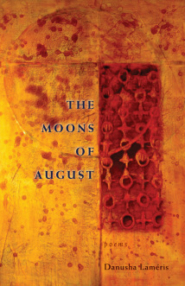Danusha Laméris, Bonfire Opera
BONFIRE OPERA, Danusha Laméris. University of Pittsburgh Press, Pittsburgh, PA 13250, 2020, 84 pages, $17 paper. https://upittpress.org.
What on earth am I to say about this stunning collection of poems?
Both elegiac (“nothing, now, but a few fistfuls of ash. Not even that, since ash / dissolves and is taken…”) and a celebration of the body’s pleasures (“To feel the way / it lifts up the octaves of sky”), Bonfire Opera took a fillet knife to my emotions, laying them wide open.
I’m not alone in my assessment of its paradoxes, and its beauty. On the back cover, Colleen J. McElroy describes the book as “a vibrant folk opera….a balance of music and imagery.” Dean Rader writes: “Everything is alive in these poems, even loss. Even death. In these finely crafted lyrics, worms, berries, skin, hawks, dirt, and desire exist and even thrive in a symbiotic relationship…”
Some of the poems are long, and begin the way a conversation or a story might (“It was late afternoon and we were standing / on the deck”; “In those days, there was a woman in our circle…”) But poem after poem stretches itself into a crescendo of sounds and images. In the title poem (the one beginning, “In those days”):
…a voice lifted into the dark, high and clear
as a flock of blackbirds. And everything was very still,
the way the congregation quiets when the priest
prays over the incense, and the smoke wafts
up into the rafters. I wanted to be that free
inside the body, the doors of pleasure
opening, one after the next, an arpeggio
climbing the ladder of sky.from “Bonfire Opera”
I wish I could read the whole book aloud to you, over a dinner of persimmons and salmon. But for now, just one poem. I chose this, by the way, in part because it hurled me back in time about twenty years, but also because it so well explains why Laméris won the 2020 Lucille Clifton Legacy Prize.
Egg
And here it goes, again, the body
hauling one out of the ovary
like coal from a mine,
lifting it up from the mother lode
by the frayed wires of late progesterone.
I can feel the familiar cramp
of effort it takes to summon
a lone ovum: my forty-odd year friend,
my little homunculus, my dwindling sack
of genetic gold. How many moons
have I carried you deep inside the secret stores?
You came into this world with me,
down the narrow birth canal, buried in the girl
until the first blood. And here we are, still
performing our same old reproductive ritual,
more formality than use. A mock battle
staged by aging warriors, turned allies.
Childless, I’ve called myself—
a son in the grave, and another seedling
gone to ash. But now I see
how far we’ve traveled together,
me and my specks of yolk,
sealed in the same skin,
spores caught in their pinules
beneath the fern’s curled fronds,
barnacles on the back of a whale,
nuggets of ore covered in silt.–Danusha Laméris
Sometimes, as I read, I think about who I might pass the book along to. But this book is one I’m going to hold onto. Like her first book, The Moons of August, it demands savoring.
You can read more about the poet, and several poems, at her website, and at Poetry Foundation.





 If I could, I would reproduce a dozen poems from
If I could, I would reproduce a dozen poems from